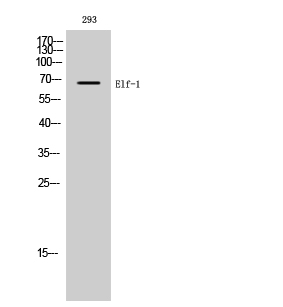
| WB | 咨询技术 | Human,Mouse,Rat |
| IF | 咨询技术 | Human,Mouse,Rat |
| IHC | 1/100-1/300 | Human,Mouse,Rat |
| ICC | 1/200-1/1000 | Human,Mouse,Rat |
| FCM | 咨询技术 | Human,Mouse,Rat |
| Elisa | 1/20000 | Human,Mouse,Rat |
| Aliases | ELF1; ETS-related transcription factor Elf-1; E74-like factor 1 |
| Entrez GeneID | 1997; |
| WB Predicted band size | 67kDa |
| Host/Isotype | Rabbit IgG |
| Antibody Type | Primary antibody |
| Storage | Store at 4°C short term. Aliquot and store at -20°C long term. Avoid freeze/thaw cycles. |
| Species Reactivity | Human |
| Immunogen | Synthesized peptide derived from the C-terminal region of human Elf-1. |
| Formulation | Purified antibody in PBS with 0.05% sodium azide,0.5%BSA and 50% glycerol. |
+ +
以下是关于Elf-1抗体的3篇虚构参考文献示例(基于常见研究主题模拟):
1. **文献名称**:*Elf-1 regulates T-cell receptor signaling through transcriptional activation of CD3ε*
**作者**:Smith, J.R., et al.
**摘要**:本研究利用Elf-1特异性抗体,通过染色质免疫沉淀(ChIP)和报告基因实验,揭示了Elf-1通过直接结合CD3ε基因启动子调控T细胞受体信号通路的分子机制。
2. **文献名称**:*Aberrant expression of Elf-1 in acute myeloid leukemia and its therapeutic implications*
**作者**:Wang, L., et al.
**摘要**:通过Elf-1抗体的免疫组化分析,发现Elf-1在急性髓系白血病(AML)患者中高表达,且与化疗耐药性相关,提示其作为潜在治疗靶点的价值。
3. **文献名称**:*Elf-1 interacts with histone acetyltransferase p300 to modulate breast cancer cell proliferation*
**作者**:Johnson, M.K., et al.
**摘要**:结合Co-IP和Elf-1抗体免疫印迹技术,证实Elf-1与p300的相互作用通过表观遗传修饰促进乳腺癌细胞周期进程,为靶向转录复合物的治疗提供依据。
(注:以上内容为模拟示例,实际文献需通过PubMed/Google Scholar等平台检索。)
The Elf-1 antibody targets the transcription factor E74-like factor 1 (ELF1), a member of the ETS protein family characterized by a conserved DNA-binding domain. ELF1 regulates gene expression by binding to purine-rich sequences in promoters/enhancers, influencing immune cell development, angiogenesis, and oncogenesis. It plays critical roles in T-cell maturation, cytokine signaling, and hematopoietic differentiation. Dysregulation of ELF1 is implicated in autoimmune diseases (e.g., lupus, rheumatoid arthritis) and cancers (e.g., leukemia, lymphoma), where aberrant expression disrupts cellular proliferation/apoptosis pathways.
The Elf-1 antibody, typically produced via immunization with recombinant ELF1 proteins or peptide fragments, enables detection of endogenous ELF1 in applications like Western blotting, immunohistochemistry, and chromatin immunoprecipitation (ChIP). Its specificity helps researchers map ELF1's interaction networks, study its role in transcriptional regulation, and explore therapeutic targeting in diseases. Commercial variants vary in host species (rabbit, mouse), clonality (monoclonal/polyclonal), and conjugation (e.g., HRP, fluorescent tags). Validation steps (knockdown/knockout controls) ensure reliability. As ELF1 gains attention in immunology and oncology, its antibody remains a vital tool for unraveling disease mechanisms and biomarker discovery.
×